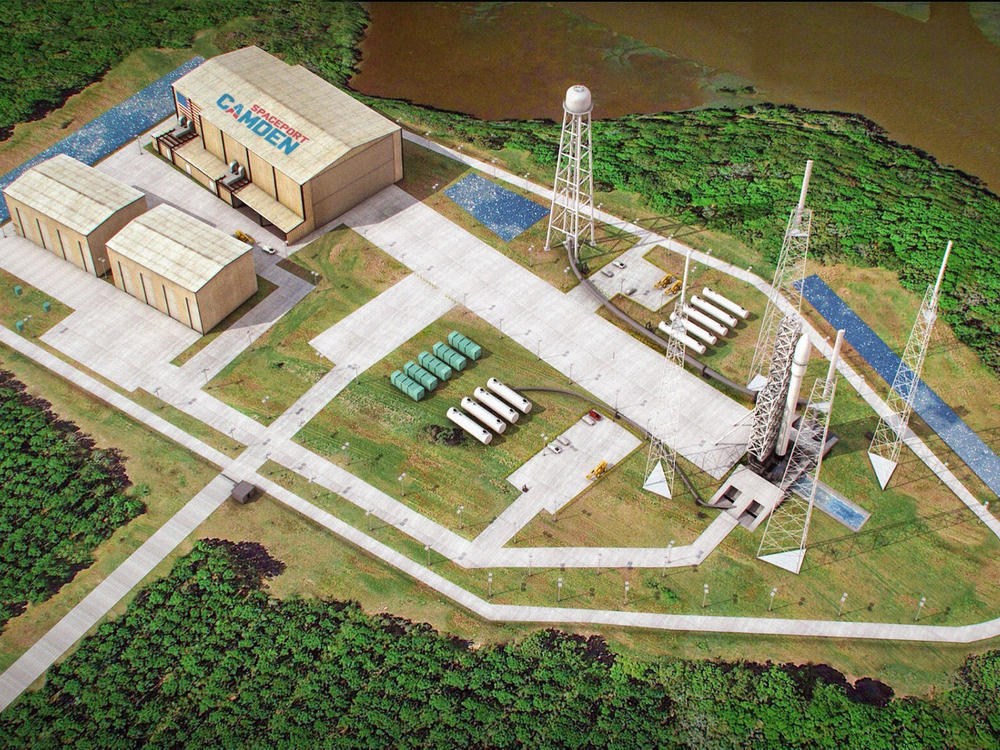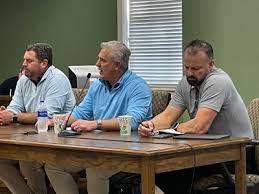
Caption
This artist's sketch provided by Spaceport Camden shows the launch pad complex of the proposed Spaceport Camden in Camden County, Ga.
Credit: Spaceport Camden

This artist's sketch provided by Spaceport Camden shows the launch pad complex of the proposed Spaceport Camden in Camden County, Ga.
Mary Landers, The Current
Camden County is forging ahead on plans for its spaceport despite last month’s referendum vote that overwhelmingly rejected the county’s purchase of the property for the dreamed-of facility.
Last week, three golf-shirted executives from Spearhead Capital Advisers gave the County Commission their plans — in very broad terms — to raise funds for a public-private partnership in Camden. Spearhead, based in Wellington, Fla., bills itself as a “boutique financial services firm focused on providing customized solutions for ultra high-net worth individuals, family offices, and asset management firms.” The company oversees about $2 billion in assets.

Representatives from Spearhead Capital make a presentation to the Camden County Commission April 7, 2022.
Private investors would fund the infrastructure. Both the county and private investors would recoup costs and ultimately profit from fees to use the spaceport. Spearhead agreed to sign nondisclosure agreements with companies that had already expressed interest to the county. It would court other investors as well, but no possibilities were named.
Camden has spent over $11 million so far to receive a site operator’s launch license from the Federal Aviation Administration in December. Additional, more stringent licensing is required for each small launch planned for a 400-acre site on the marsh a few miles west of Cumberland Island.
The Spearhead executives praised Camden’s setting near recreational beach as well as near major transportation hubs, echoing County Administrator Steve Howard’s talking point that the spaceport could be a catalyst for the development of a “silicon marsh.”
“You have three deepwater ports on the Eastern Seaboard. You have a very highly educated populace in this county. You already have great schools, as you have people moving here, because of your school systems,” Jarrett Bostwick, Spearhead general counsel and co-founder said.
His claim about the education levels isn’t backed by data. The U.S. Census indicates Camden lags behind the state average for the percentage of its adult population with a college degree at 23% versus the state’s 32%. The public schools, however, do tend to score well on sites like greatschools.org, where two-thirds of the district’s schools are rated above average.
“You have access to 95, I-10, I-75,” Bostwick continued. “For any of these components on an innovation, a development, to find its way to a broader commercial setting, the natural attributes of where this asset sits is second to none. That breaks down so many other barriers, if you’re trying to argue a business reason why someone who has to respond to their shareholders in the private sector, that aspect of this area breaks down so many. It’s a tiebreaker in so many ways.”
Spearhead said it would take about six months to draw up a business plan once it got the go-ahead from the county. It wouldn’t charge the county a fee for its work.
Howard, the county administrator, spoke at an Exchange Club meeting in Savannah Monday. Spearhead is just the first of many investment companies the county is publicly considering, he said afterwards.
“I get lots and lots of people, well-funded ones” he said. “(Spearhead) was the first that was willing to be unmasked.”
The March 8 referendum, he said in response to an audience question, was “an interesting process.”
Held as a one-issue special election, the referendum attracted 5,782 voters, with 72% of them voting to repeal the county commission’s resolution to buy the spaceport property. Low voter turnout meant that 72% represented 12% of registered voters, Howard noted. But some county officials have been elected with fewer votes. For example, 3,275 residents voted for County Commission Chairman Gary Blount when he ran unopposed in 2018.
Howard also complained that the wording of the referendum confused voters.
“No, meant yes. And yes meant no. I mean, that’s the way it was written,” he said. “So after that, a lot of people said what is your plan B, we still want this to happen. You know, so we understood that.”
Camden is opposing its own voters and taking the matter to the Georgia Supreme court to decide on the validity of the referendum. The county contends that Georgia’s “home rule” provisions prevent citizens from taking matters like a County Commission resolution to the ballot box.
“We have tier one and tier two powers,” said Howard, referring to a county’s basic ordinance power and power to amend or repeal certain local Acts of the General Assembly. “If that was allowed to stand they could that could be problematic for governments in the state of Georgia.”
Property records indicate Organic Capital Fund LLC bought the nearly 8,000-acre property from Bayer CropScience for $1 on Feb. 25, 2022. Organic Capital then applied for Brownfield status with the Georgia Environmental Protection Division. Brownfield status “provides liability protection to prospective purchasers of contaminated properties from third party claims arising from past releases and groundwater cleanup,” according to the EPD website. “In exchange, they must investigate and clean up soil and source material to meet (certain) standards.”
“It’s not related to spaceport,” said Chris Roberds, manager of Organic Capital Fund.
But the Environmental Impact Statement completed for Spaceport Camden considers the former Bayer property as a “buffer to ensure the safety of the public.”
“Frankly we don’t know what we’re going to do with it,” Roberds said of the property. He does know it will not be a residential use. Organic Capital included that restriction on the deed, Roberds said.
“We’re going to put it in a brownfield, then clean it up and get it in compliance.”
This story comes to GPB through a reporting partnership with The Current, providing in-depth journalism for Coastal Georgia.